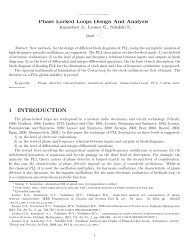Technical Sessions – Monday July 11
Technical Sessions – Monday July 11
Technical Sessions – Monday July 11
You also want an ePaper? Increase the reach of your titles
YUMPU automatically turns print PDFs into web optimized ePapers that Google loves.
� TB-09<br />
Tuesday, <strong>11</strong>:00-12:30<br />
Meeting Room 108<br />
Meta-heuristic Approaches to Vehicle<br />
Routing<br />
Stream: Vehicle Routing<br />
Invited session<br />
Chair: Bülent Çatay, Faculty of Eng. & Natural Sciences, Sabanci<br />
University, Tuzla, 34956, Istanbul, Turkey, catay@sabanciuniv.edu<br />
Chair: Louis-Martin Rousseau, Mathematics and Industrial<br />
Engineering, École Polytechnique de Montréal, CP6079 succ<br />
centre-ville, H3C 3A7, Montreal, QC, Canada,<br />
louism@crt.umontreal.ca<br />
1 - Optimizing Cash Delivery Operations for Bantas Using<br />
Tabu Search: A Case Study<br />
Burcin Bozkaya, Faculty of Management, Sabanci University,<br />
Orhanli, Tuzla, 34956, Istanbul, Turkey,<br />
bbozkaya@sabanciuniv.edu, Alper Erdemir<br />
Bantas A.S., a company formed as a joint venture of 3 major banks in Turkey,<br />
must deliver cash everyday to more than 1200 branches and ATMs in Turkey,<br />
using a fleet of 120+ vehicles. The solution we implemented at Bantas utilizes<br />
ArcLogistics, a commercial route optimization software built on Tabu Search<br />
heuristic optimization principles. We describe details of this implementation<br />
along with an overview of the meta-heuristic used and some numerical results.<br />
We also describe the integration of this system with a vehicle tracking application<br />
that allows comparison of planned vs. actual routes.<br />
2 - Solving Bakery Distribution Planning Problem Using a<br />
Genetic Algorithm<br />
Timur Keskinturk, School of Business, University of Istanbul,<br />
Turkey, tkturk2010@gmail.com, Mehmet Bayram Yildirim<br />
In this paper, we analyze a distribution problem at a bakery company. This<br />
bakery utilizes its own truck fleet to deliver different types of breads to serve<br />
grocery stores in a large metropolitan area. Problem is modeled as a variation<br />
of a capacitated vehicle routing problem with time windows. To obtain good<br />
quality solutions in a reasonable amount of time, a genetic algorithm with a<br />
two exchange improvement local search heuristic is proposed. The proposed<br />
algorithm which improves the bakery’s distribution significantly is also tested<br />
on several problems.<br />
3 - Route Optimization for Mobile Phone Distribution and<br />
Repair Service<br />
Vincent F. Yu, Department of Industrial Management, National<br />
Taiwan University of Science and Technology, 43, Sec. 4,<br />
Keelung Rd., 106, Taipei, Taiwan, vincent@mail.ntust.edu.tw,<br />
Shan-Huen Huang, Tirza Naftali, Hsiu-I Ting<br />
Mobile phone distributors dispatch vehicles from several distribution centers<br />
(DCs) to service points to deliver new phones, parts, and repaired products, and<br />
pick up recycled phones and repair orders. Under such distribution mode, it is<br />
important to appropriately select the location of DCs and plan vehicle routes to<br />
minimize the total distribution cost. We formulate the problem as the location<br />
routing problem with simultaneous pickup and delivery problem (LRPSPD). A<br />
mathematical programming model and a heuristic based on genetic algorithm<br />
are developed for solving the LRPSPD.<br />
4 - Metaheuristics for an Oil Delivery Vehicle Routing Problem<br />
Louis-Martin Rousseau, Mathematics and Industrial<br />
Engineering, École Polytechnique de Montréal, CP6079 succ<br />
centre-ville, H3C 3A7, Montreal, QC, Canada,<br />
louism@crt.umontreal.ca, Guy Desaulniers, Eric<br />
Prescott-Gagnon<br />
IFORS 20<strong>11</strong> - Melbourne TB-10<br />
Companies distributing heating oil typically solve vehicle routing problems on<br />
a daily basis. Their problems may involve various features such as a heterogeneous<br />
vehicle fleet, multiple depots, intra-route replenishments, time windows,<br />
driver shifts and optional customers. In this paper, we consider such a rich<br />
vehicle routing problem that arises in practice and develop three metaheuristics<br />
to address it, namely, a tabu search (ts) algorithm, a large neighborhood<br />
search (lns) heuristic based on this ts heuristic and another lns heuristic based<br />
on a column generation (cg) heuristic. Computational results obtained on instances<br />
derived from a real dataset indicate that the lns methods outperform<br />
the ts heuristic. Furthermore, the lns method based on cg tends to produce<br />
better quality results than the ts-based lns heuristic, especially when sufficient<br />
computational time is available.<br />
� TB-10<br />
Tuesday, <strong>11</strong>:00-12:30<br />
Meeting Room <strong>11</strong>1<br />
Railway Applications I<br />
Stream: Public Transit<br />
Invited session<br />
Chair: Dennis Huisman, Econometric Institute, Erasmus University,<br />
Rotterdam, Netherlands, huisman@ese.eur.nl<br />
1 - Passenger Oriented Disruption Management: the Value<br />
of Smart Card Data<br />
Evelien Van der Hurk, Erasmus University, NL-3000 DR,<br />
Rotterdam, Netherlands, EHurk@rsm.nl<br />
In disruption management the emphasis is shifting from rescheduling resources<br />
(rolling stock and crew) to passenger service. For passenger oriented disruption<br />
management, information is needed on passengers’ movements, destination<br />
and behavior during a disruption. Our case study shows that smart card<br />
data provides this information. The value of smart card data for disruption<br />
management is twofold. We can better predict passenger flows and thus the<br />
seat demand during a disruption. Also, it can be used for estimating passenger<br />
delays and for evaluating the disruption management strategy.<br />
2 - Passenger Oriented Disruption Management by Adapting<br />
Stopping Patterns & Rolling Stock Schedules<br />
Lucas Veelenturf, Department of Decision and Information<br />
Sciences, Rotterdam School of Management, Erasmus<br />
University, Postbus 1738, NL-3000 DR, Rotterdam, Netherlands,<br />
LVeelenturf@rsm.nl, Gabor Maroti, Leo Kroon<br />
Often unforeseen disruptions require railway operators to quickly adjust the<br />
timetable and resource schedules, and passengers to adapt their routes to their<br />
destinations. The railway operator has to take the changed passenger behavior<br />
into account. Next to increasing capacities of trains for which the operator<br />
expects more demand it may be useful to operate additional trains or to adapt<br />
stopping patterns, e.g. intercity trains also dwell at regional stations. In this<br />
research we construct a passenger oriented rolling stock rescheduling approach<br />
which integrates such stopping pattern decisions.<br />
3 - Minimization of Delay Propagation in Multi-area Railway<br />
Traffic Control<br />
Dario Pacciarelli, Dipartimento di Informatica e Automazione,<br />
Università Roma Tre, via della vasca navale, 79, 00146, Roma,<br />
Italy, pacciarelli@dia.uniroma3.it, Francesco Corman, Andrea<br />
D’Ariano, Marco Pranzo<br />
Optimization of multi-area railway traffic control is a bilevel programming<br />
problem in which a coordinator imposes constraints at the border of several<br />
dispatching areas. Each area is controlled by a dispatcher which reschedules<br />
trains by minimizing delays in its area. The coordinator objective is to attain<br />
global feasibility and optimality of the decisions taken by all dispatchers. We<br />
present a branch and bound procedure for the coordinator problem that has<br />
been tested on a large real railway network in the Netherlands with busy traffic<br />
conditions. Experimental results are very promising.<br />
4 - Mathematical Model Analyses for the Optimal Railway<br />
Track Maintenance Strategy with Consideration on Risk<br />
for Derailment Accident<br />
Masashi Miwa, Track Management, Railway <strong>Technical</strong> Research<br />
Institute, 2-8-38 Hikari-cho Kokubunji-shi, 185-8540,<br />
Kokubunji, Tokyo, Japan, miwa@rtri.or.jp, Tatsuo Oyama<br />
43




